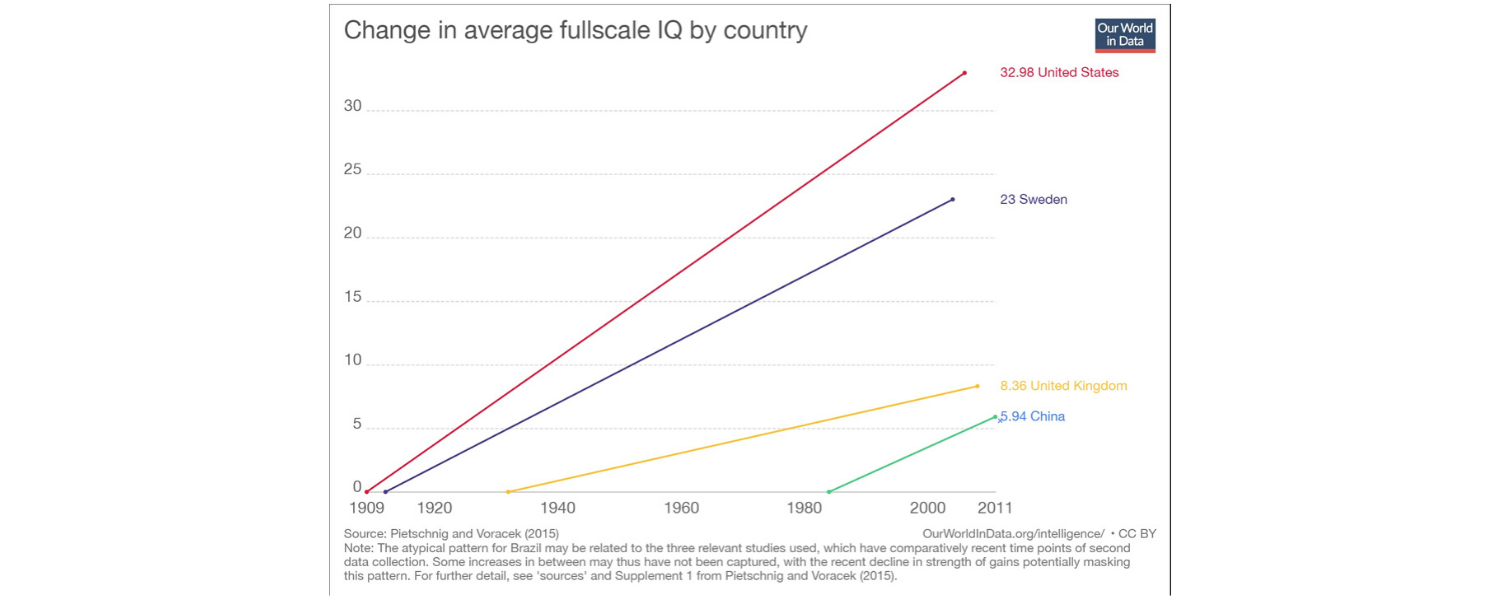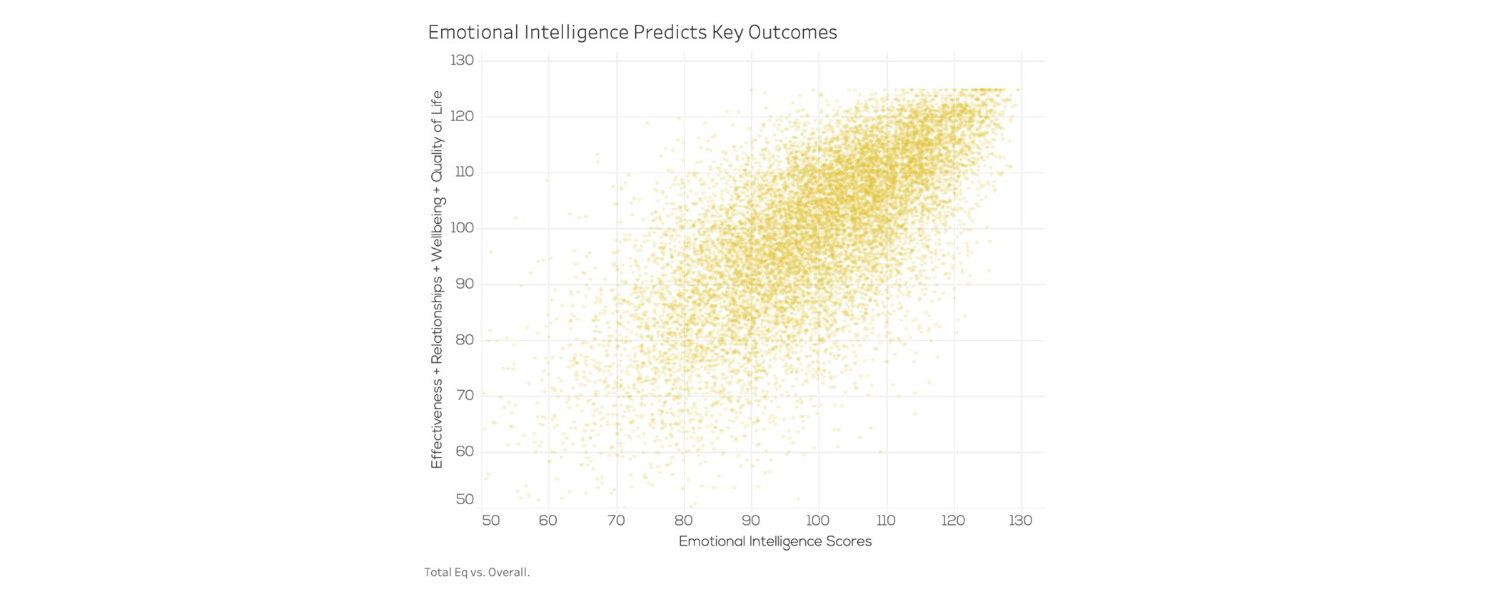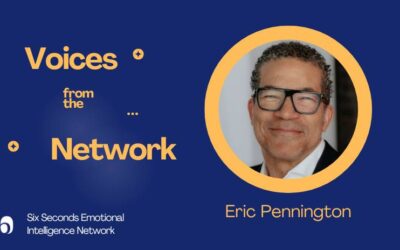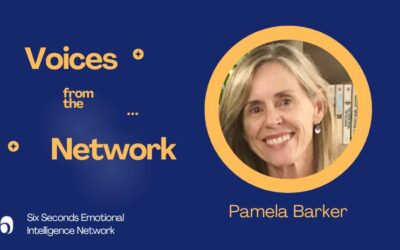EQ vs IQ
Why it matters
what you measure
How many hours have you spent learning math and science in your life? Think about kindergarten all the way through high school or university. Hundreds, probably thousands? Even tens of thousands? And how many hours have you spent learning about emotions? How they work in our brains and bodies? How to recognize, label and transform them in yourself and others? For most people in the world, the answer is almost none.
Considering this, is it surprising where we find ourselves at this stage in history, as we enter the 4th Industrial Revolution? We have smartphones, microbots performing heart surgery, and cars that can brake themselves to avoid accidents. But at the same time, we are lonelier, more frustrated, and more disconnected than ever before. It isn’t that our education system has failed. It’s been spectacularly successful, at least on the whole, at improving what it values, measures, and teaches. Let’s look at the dramatic rise in cognitive intelligence over the past 100 years and the digital revolution it’s fueled, and then consider: What would happen if we adopted a different, more balanced approach for the next 100 years? What would it look like if we invested the same resources in emotional intelligence as we do in cognitive intelligence? Or even just 10% more than we do now?
IQ as the ultimate measure of success
IQ, the most common measure of cognitive intelligence, has become the basic standard in Western society of how smart someone is, and how successful they can be. In some ways, it has become a kind of cultural obsession. We’ve begun to test for IQ at earlier and earlier ages and produce literally thousands of products that promise to make your child the next Einstein. And because of the importance we give it, school curriculums have naturally gravitated toward prioritizing these skills, too. The result? IQ has steadily increased over the past century. Check out this graph:

What does an IQ test measure? Verbal processing, logical reasoning abilities, mathematical problem solving, and working memory, among other things. But as even the test’s founders acknowledged, it has many limitations. In a task-based test like this, you can only measure tasks that you can have people do right there in the testing room. That naturally excludes many types of intelligence, especially ones that are social or emotional in nature. Solving emotional problems is a type of intelligence we use literally all the time, but because it occurs in landscapes with constantly changing variables and a lack of clear, correct answers, it isn’t as easy to measure as cognitive intelligence. So for the most part, we don’t try.
But the reality, of course, is that life is messy. It occurs in these ever changing landscapes. Humans are social creatures, driven by emotion. High IQ scores are no guarantee of success. Many geniuses struggle to meet even their basic needs. It’s not that cognitive intelligence isn’t important. But it’s far from the only, or even best, measure of success.
Research: EQ and success
Dan Goleman, then a columnist for The New York Times, became the first person to popularize the case against IQ as the ultimate measure of success, in his bestselling book: Emotional Intelligence: Why It Matters More Than IQ. He argues in his book, based on the research of Peter Salovey and John Mayer, that IQ accounts for only 20% of a person’s success in life. And since he published that research, a growing body of evidence has confirmed his hypothesis. EQ is twice as predictive of performance as IQ. Check out this graph of EQ and life success, which is from a large, randomized and global sample of over 75,000 individuals.

What do you notice? I notice the white spaces in the top left and bottom right corners. These spaces indicate that there are almost no individuals who score low on EQ and high on Success – or vice versa. People with high emotional intelligence are likely to be doing well, to be effective at work, to have strong relationships, good health and a high quality of life. And people with low emotional intelligence? They are much more likely to be suffering, to be in poor health and unhappy with their social connections.
And what does EQ measure? The ability to identify your own and others’ emotions, and recognize one’s own patterns. The skill of seeing and weighing decisions, and connecting to yourself and others. This study used the Six Seconds Emotional Intelligence Assessment, a psychometrically valid test that has been used in over 150 countries.
So does that mean we should abandon IQ tests in favor of EQ tests?
IQ or EQ? That’s the wrong question
Let me be clear: I am not saying that cognitive intelligence isn’t important. It is important, and has led to incredible advancements for human civilization. But you get what you measure, and right now we’re only focusing on one half, or less, of the equation. And our most pressing problems right now aren’t due to weapons that aren’t powerful enough or computers that aren’t smart enough. Our biggest problems are emotional, relational. Investing in one side doesn’t mean abandoning the other. In fact, a growing body of research has found that social and emotional learning enables and improves cognitive learning. This isn’t an either or situation. It’s recognizing that these two types of intelligence need to work together.
So what would happen if we decided to focus a little bit more on EQ in the next 100 years, as well as IQ?
For more on this debate between EQ and IQ, read this article: The EQ and IQ Debate: Which Is Better? Honestly, It’s the Wrong Question.
Where do we want to be in 100 years?
Or if that feels too far off, what about in 10, 15 or 20 years? Do we want more people than ever reporting that they feel disconnected, lost, and alone? Most of us would say no. Then the next question is, what do we need to value, prioritize, measure, and teach to get where we want to go? What internal capacities do we need to develop – and teach the next generation – so that they feel a sense of purpose, belonging and hope? Would emotional intelligence skills be helpful? According to a growing body of research, the answer is yes. What do you think?
For more on the research between EQ and success, explore this article:
To make the case for emotional intelligence in schools, check out this free eBook:
EQ vs IQ
Why it matters
what we measure
What’s new in emotional intelligence?
In the Age of ChatGPT, What Should Teachers Focus On?
AI tools like ChatGPT are transforming education, prompting a shift from knowledge transfer to fostering skills like empathy, creativity, and critical thinking. This article emphasizes the role of Emotional Intelligence in inspiring engagement and purpose, helping educators adapt to the evolving demands of an AI-driven world.
What Should Schools Prepare Us For? Educating for a Future That Inspires and Uplifts
In Italy, only 5% of workers are engaged in their jobs—an economic crisis with deep roots in the education system. What needs to change?
From Enemy to Ally: How Eric Pennington Changed His Relationship with His Own Emotions – and Found His Life’s Purpose
How emotional intelligence helped Eric Pennington transform corporate life setbacks into strengths – and find purpose in both work and life.
Emotional Intelligence at Work: In the Era of AI, What Happens to Human Skills?
Who’s winning the artificial intelligence race: machines or people? Research finds AI investment leads to disinvestment in human skills
Fortifying the Mental Health of the Entire School Community with Emotional Intelligence
Wellbeing program at St. Peter’s Primary replenishes reserves post-COVID: ‘Truly life changing for many of our staff,’ school leaders say. Read the full case study here.
Helping Others Achieve Overall Well-being and Healthy Connections: How Emotional Intelligence Guided Pamela Barker’s Career Path Growth
Pamela Barker’s journey began with healing bodies, but it was her discovery of emotional intelligence that unlocked her true purpose: helping others achieve overall well-being and healthy connections. From her days as a physical therapist to becoming a passionate EQ coach, Pamela’s story is one of transformation, resilience, and the power of connection. Her experience shows that real change starts from within.
- How Emotional Intelligence Coaches Use Emotions in Goal Setting - October 2, 2024
- 3 Winning Strategies for Successful Change Leadership: Coaching with Emotional Intelligence - September 4, 2024
- 3 Emotional Intelligence Tips for the Essence of Coaching - July 31, 2024







C’est cool ça !
EQ measures the ability to identify your own and others’ emotions, and recognize one’s own patterns. The skill of seeing and weighing decisions, and connecting to yourself and others
A great article that has helped to understand the necessity of building a bridge between EQ and IQ